- Home
- Christopher Paolini
Inheritance i-4 Page 29
Inheritance i-4 Read online
Page 29
An indeterminate amount of time passed. They might have spent an hour in the tunnel. They might have spent ten. Or maybe it was only a few minutes. Whatever the case, Eragon’s neck and shoulders hurt from standing half bent over, and he grew tired of staring at what seemed to be the same twenty feet of rose-hued stone.
At last he noticed the echoes were waning and ever more of a delay was appearing between each repetition of the sounds. Soon afterward, the tunnel disgorged them into a large rectangular chamber with a ridged, half-dome ceiling over fifteen feet high at its apex. The chamber was empty, except for a rotting barrel in one corner. Across from them, three identical archways opened to three identical rooms, small and dark. Where those led, Eragon could not see.
The group stopped, and Eragon slowly straightened his back, wincing as his sore muscles stretched.
“This would not have been part of Erst Graybeard’s plans,” said Arya.
“Which path should we pick?” asked Wyrden.
“Isn’t it obvious?” asked the herbalist. “The left one. It’s always the left one.” And she strode toward that selfsame arch even as she spoke.
Eragon could not help himself. “Left according to which direction? If you were starting from the other side, left-”
“Left would be right and right would be left, yes, yes,” said the herbalist. Her eyes narrowed. “Sometimes you’re too clever for your own good, Shadeslayer.… Very well, we’ll try it your way. But don’t say I didn’t warn you if we end up wandering around here for days on end.”
Eragon would actually have preferred to take the center archway, as it seemed the most likely to lead them up to the streets, but he did not want to get into an argument with the herbalist. Either way, we’ll find stairs soon enough, he thought. There can’t be that many chambers under Dras-Leona.
Holding her werelight aloft, Angela took the lead. Wyrden and Arya followed while Eragon brought up the rear.
The room through the rightmost archway was larger than it had first appeared, for it extended to the side for twenty feet, then turned and continued for another few yards, whereupon it ended at a corridor studded with empty sconces. Down the corridor was another small room lined with three arches, each of which led to rooms with even more archways, and so on.
Who built these and why? Eragon wondered, bewildered. All the rooms they saw were deserted and empty of furnishings. The only things they found within were a two-legged stool that fell apart when he nudged it with the tip of his boot and a pile of broken pottery lying in a corner beneath a veil of spiderwebs.
Angela never hesitated or seemed confused about which direction to go, for without fail, she chose the path to the right. Eragon would have objected, except that he could think of no better alternative to her method.
The herbalist stopped when they arrived at a circular room with seven equally spaced archways placed along the walls. Seven corridors, including the one they had just traversed, stretched out from the archways.
“Mark where we came from, or we’ll get completely turned around,” said Arya.
Eragon went to the corridor and, with the tip of Brisingr’s cross-guard, scratched a line on the stone wall. As he did, he peered into the darkness, searching for a glimpse of Solembum, but he saw not so much as a whisker. Eragon hoped the werecat had not gotten lost somewhere in the maze of rooms. He almost reached out with his mind to find him, but resisted the urge; if anyone else felt him groping around, it might alert the Empire to their location.
“Ah!” exclaimed Angela, and the shadows around Eragon shifted as the herbalist stood on tiptoe and raised her werelight as high as she could.
Eragon hurried to the center of the room, where she stood with Arya and Wyrden. “What is it?” he whispered.
“The ceiling, Eragon,” murmured Arya. “Look at the ceiling.”
He did as he was told, but saw only blocks of ancient, mold-covered stones crazed with so many cracks, it seemed amazing the ceiling had not collapsed long ago.
Then his vision shifted and he gasped.
The lines were not cracks but rather deeply carved runes-rows of them. They were neat and small, with sharp angles and straight stems. Mold and the passage of centuries had obscured parts of the text, but most of it remained legible.
Eragon struggled with the runes for a short while, but he recognized only a few of the words, and those were spelled differently than he was used to. “What does it say?” he asked. “Is it Dwarvish?”
“No,” said Wyrden. “It is the language of your people, but as it was spoken and written long ago, and of a very particular dialect: that of the zealot Tosk.”
The name struck a chord in Eragon. “When Roran and I rescued Katrina, we heard the priests of Helgrind mention a book of Tosk.”
Wyrden nodded. “It serves as the foundation of their faith. Tosk was not the first to offer up prayers to Helgrind, but he was the first to codify his beliefs and practices, and many others have imitated him since. Those who worship Helgrind regard him as a prophet of the divine. And this”-the elf cast his arms out wide-“is a history of Tosk, from his birth to his death: a true history, such as his disciples have never shared with those outside their sect.”
“We could learn much from this,” said Angela, never taking her eyes off the ceiling. “If only we had the time …” Eragon was surprised to see her so enthralled.
Arya glanced at the seven corridors. “A moment, then, but read quickly.”
While Angela and Wyrden perused the runes with avid intensity, Arya walked over to one of the archways and, in an undertone, began to chant a spell for finding and locating. When she finished, she waited a moment with her head cocked, then moved on to the next archway.
Eragon stared at the runes a bit longer. Then he returned to the mouth of the corridor that had brought them to the room and leaned against a wall while he waited. The cold of the stones seeped into his shoulder.
Arya stopped in front of the fourth archway. The now-familiar cadence of her recitation rose and fell like a soft sigh of wind.
Again, nothing.
A faint tickling on the back of his right hand caused Eragon to look down. A huge, wingless cricket clung to his glove. The insect was hideous: black and bulbous, with barbed legs and a massive, skull-like head. Its carapace gleamed like oil.
Eragon shuddered, his skin crawling, and shook his arm, flinging the cricket into the darkness.
It landed with an audible thump.
The fifth corridor proved no more fruitful for Arya than the preceding four. She bypassed the opening where Eragon stood and stationed herself in front of the seventh archway.
Before she could cast her spell, a guttural yowl echoed down the corridors, seemingly from all directions at once; then there was a hiss and a spat and a screech that made every hair on Eragon’s body stand on end.
Angela whirled around. “Solembum!”
As one, the four of them drew their blades.
Eragon backed into the center of the room, his gaze darting from one archway to the next. His gedwey ignasia itched and tingled like a fleabite-a useless warning, for it did not tell him where or what the danger was.
“This way,” said Arya, moving toward the seventh archway.
The herbalist refused to budge. “No!” she whispered vehemently. “We have to help him.” Eragon noticed that she held a short sword with a strange colorless blade that flashed gemlike in the light.
Arya scowled. “If Murtagh learns we’re here, we’ll-”
It happened so quickly and silently, Eragon would never have noticed had he not been looking in the right direction: a half-dozen doors hidden within the walls of three different corridors swung open, and thirty or so black-garbed men ran out toward them, swords in hand.
“Letta!” shouted Wyrden, and the men in one group collided with each other as if those in front had run headlong into a wall.
Then the rest of the attackers fell upon them, and there was no time for magic. Eragon easily
parried a stab, and with a looping backhanded stroke, sliced off the attacker’s head. Like all the others, the man wore a kerchief tied over his face, so only his eyes were exposed, and the kerchief fluttered as the head fell spinning toward the floor.
Eragon was relieved when he felt Brisingr sink into flesh and blood. For a moment, he had feared that their opponents were protected by spells or armor-or, worse, that they were something other than human.
He skewered another man through the ribs and had just turned to deal with two more of his attackers when a sword that should not have been there arced through the air toward his throat. His wards saved him from certain death, yet with the blade an inch away from his neck, Eragon could not help but stumble back.
To his astonishment, the man he had stabbed was still standing, blood streaming down his side, seemingly oblivious to the hole Eragon had poked through him.
Dread settled over Eragon. “They can’t feel pain,” he shouted, even as he frantically blocked swords from three different directions. If anyone heard him, they failed to respond.
He wasted no more time talking, but concentrated on fighting the men in front of him, trusting his companions to protect his back.
Eragon lunged and parried and dodged, whipping Brisingr through the air as if it weighed no more than a switch. Ordinarily, he could have killed any of the men in an instant, but the fact that they were impervious to pain meant that he had to either behead them, stab them through the heart, or cut them and hold them off until loss of blood rendered them unconscious. Otherwise, the attackers kept trying to kill him, regardless of their injuries. The number of men made it difficult to evade all of their blows and strike back in return. He could have stopped defending himself and just let his wards protect him, but that would tire him just as quickly as swinging Brisingr. And since he could not predict exactly when his wards would fail-as they must at a certain point, else they would kill him-and he knew he might need them later on, he fought just as carefully and cautiously as if he were facing men whose swords could kill or maim with a single stroke.
More black-garbed warriors streamed out of the hidden doorways within the corridors. They crowded around Eragon, pushing him back through sheer weight of numbers. Hands clung to his legs and arms, threatening to immobilize him.
“Kverst,” he growled under his breath, uttering one of the twelve death words Oromis had taught him. As he had suspected, his spell had no effect: the men were warded against direct magical attacks. He quickly readied a spell Murtagh had once used on him: “Thrysta vindr!” It was a roundabout way of striking at the men, as he was not actually hitting them but rather pushing the air against them. In any case, it worked.
A howl of wind filled the chamber, clawing at Eragon’s hair and cloak and sending the men closest to him flying back into their compatriots, clearing a space of ten feet in front of him. His strength decreased commensurately, but not enough to incapacitate him.
He turned to see how the others were doing. He had not been the first to find a way to circumvent the men’s wards; bolts of lightning extended from Wyrden’s right arm and wrapped themselves around any warrior unfortunate enough to pass in front of him. The glowing cables of energy appeared almost liquid as they writhed around their victims.
Still more men were forcing their way into the room, however.
“This way!” cried Arya, and sprang toward the seventh corridor-the one she had failed to examine before the ambush.
Wyrden followed, as did Eragon. Angela brought up the rear, limping and clutching at a bloody cut on her shoulder. Behind them, the black-garbed men hesitated, milling in the chamber for a moment. Then, with a mighty roar, they gave chase.
As he sprinted down the corridor, Eragon strove to compose a variation of his earlier spell that would allow him to kill the men instead of just knocking them away. He quickly devised one and held it in readiness to use as soon as he could see a fair number of the attackers.
Who are they? he wondered. How many of them are there?
Up ahead, he glimpsed an opening through which shone a faint purplish light. He just had time to feel apprehensive about its source before the herbalist uttered a loud cry, and there was a dull orange flash and a teeth-jarring thud, and the smell of sulfur filled the air.
Eragon whirled around to see five men dragging the herbalist through a doorway that had opened in the side of the corridor. “No!” yelled Eragon, but before he could stop it, the door swung shut as silently as it had opened, and the wall appeared perfectly solid once more.
“Brisingr!” he shouted, and his sword erupted in flame. He placed the tip against the wall and attempted to push it through the stone, intending to cut open the door. The stone was thick, though, and slow to melt, and he soon realized it would take far more energy than he was willing to sacrifice.
Then Arya appeared beside him, and she placed a hand where the door was and murmured, “Ladrin.” Open. The door remained stubbornly closed, but Eragon was embarrassed he had not thought to try that first.
Their pursuers were so close by now that he and Arya had no choice but to turn and face them. Eragon wanted to cast the spell he had invented, but the corridor was only wide enough for two men to approach at a time; he would not be able to kill the rest, as they were hidden from sight. Better to keep the spell a secret, he decided, and save it for when he could wipe out most of the warriors at once.
He and Arya beheaded the two lead men, then attacked the next pair of warriors as they stepped over the bodies. In quick succession, they killed six more men, but there seemed to be no end of them.
“Through here!” shouted Wyrden.
“Stenr slauta!” exclaimed Arya, and all along the corridor-up to a few yards from where she stood-the stones in the walls exploded into the passageway. The hail of sharp fragments caused the black-clad men to cower and falter, and more than one fell to the floor, crippled.
Together Eragon and Arya turned to follow Wyrden, who was running toward the opening at the end of the corridor. The elf was only thirty feet away from it.
Then ten …
Then five …
And then a thicket of amethyst spikes shot out of holes in the floor and the ceiling, catching Wyrden between them. The elf seemed to float in the middle of the corridor, the spikes less than an inch away from his skin as his wards repelled the crystal thorns. Then a crackling discharge of energy ran the length of each spike and the needle-sharp tips flared painfully bright, and with an unpleasant crunch, they slid home.
Wyrden screamed and thrashed, and then his werelight went out and he moved no more.
Eragon stared with disbelief as he stumbled to a stop before the spikes. For all his experience in battle, he had never before been present at the death of an elf. Wyrden and Blodhgarm and the rest of their cohort were so accomplished, Eragon had believed that the only way they were likely to die was while fighting either Galbatorix or Murtagh.
Arya appeared equally stunned. She rallied quickly, however. “Eragon,” she said in an urgent voice, “cut us a path with Brisingr.”
He understood. His sword, unlike hers, would be impervious to whatever evil magic the spikes contained.
He drew back his arm and swung as hard as he could. A half-dozen of the spikes shattered beneath Brisingr’s adamantine edge. The amethyst emitted a bell-like tone as it broke, and when the shards struck the ground, they tinkled like ice.
Eragon kept to the right of the corridor, making sure not to hit the blood-streaked spikes that held up Wyrden’s body. Again and again he swung, hacking his way through the glittering thicket. With every blow, he sent pieces of amethyst flying through the air. One sliced his left cheek, and he winced, surprised and concerned that his wards had failed.
The jagged remnants of the broken spikes forced him to move carefully. The stumps below could easily pierce his boots, while the ones above threatened to cut him about the head and neck. Still, he managed to navigate to the far side of the thicket with only a small
gash on his right calf, which stung whenever he put his weight on the leg.
The black-clad warriors nearly caught up with them as he helped Arya past the last few rows of spikes. Once she was free, they rushed through the opening and into the purplish light, Eragon with every intention of then turning around and confronting their attackers head-on and killing every last one of them in retaliation for Wyrden’s death.
On the other side of the opening was a dark, heavily built chamber that reminded Eragon of the caves under Tronjheim. A huge circular pattern of inlaid stone-marble and chalcedony and polished hematite-occupied the center of the floor. Around the edge of the patterned disk stood rough, fist-sized chunks of amethyst set within silver collars. Each piece of the purple rock glowed softly-the source of the light they had seen from the corridor. Across the disk, against the far wall, was a large black altar draped with a gold and crimson cloth. Pillars and candelabra flanked the altar, with a closed door on each side.
All this Eragon saw as he barreled into the room, in the brief instant before he realized that his momentum was going to carry him through the ring of amethysts and onto the disk. He tried to stop himself, tried to turn aside, but he was moving too fast.
Desperate, he did the one thing he could: he jumped toward the altar, hoping he could clear the disk in a single bound.
As he sailed over the nearest of the amethyst stones, his last feeling was regret, and his last thought was of Saphira.
TO FEED A GOD
The first thing Eragon noticed was the difference in the colors. The stone blocks in the ceiling appeared richer than before. Details that had been obscure now seemed sharp and vivid, while others that had been prominent were subdued. Below him, the sumptuous nature of the patterned disk was even more apparent.
It took him a moment to understand the reason for the change: Arya’s red werelight no longer illuminated the chamber. Instead, what light there was came from the muted glow of the crystals and the lit candles in the candelabra.

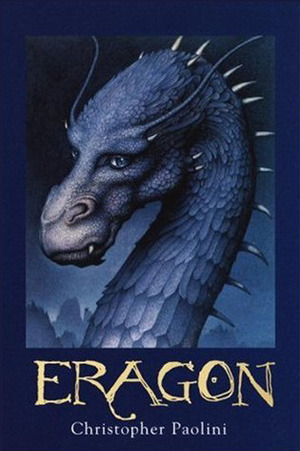 Eragon
Eragon Eldest
Eldest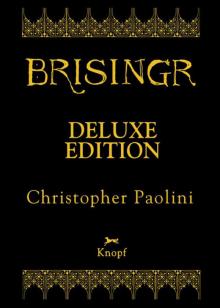 Brisingr
Brisingr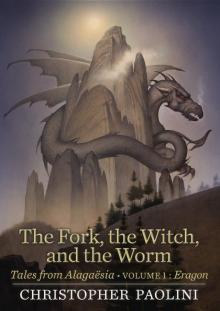 The Fork, the Witch, and the Worm
The Fork, the Witch, and the Worm To Sleep in a Sea of Stars
To Sleep in a Sea of Stars![Eldest [en] i-2 Read online](http://i1.bookreadfree.com/i/03/19/eldest_en_i-2_preview.jpg) Eldest [en] i-2
Eldest [en] i-2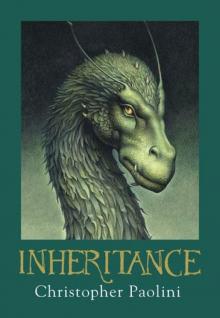 Inheritance i-4
Inheritance i-4![Brisingr [en] i-3 Read online](http://i1.bookreadfree.com/i1/03/31/brisingr_en_i-3_preview.jpg) Brisingr [en] i-3
Brisingr [en] i-3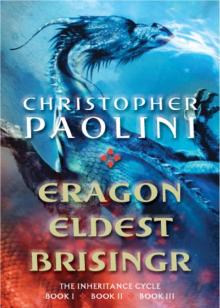 Inheritance Cycle Omnibus
Inheritance Cycle Omnibus